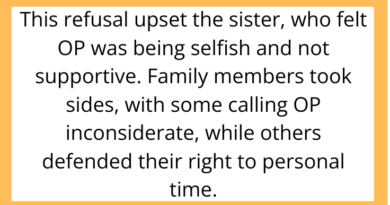AITAH for Not Letting My Fiancé’s Teen Daughter Wear White to Our Wedding?
When love brings two families together, everyone hopes for harmony. But sometimes, blending families reveals big differences in expectations and boundaries—especially when it comes to weddings. That’s exactly what happened to one Reddit user who faced a dilemma: Am I the jerk for telling my fiancé’s teenage daughter she couldn’t wear a white dress to our wedding?
This story unpacks the tension between inclusion, respect, and tradition—and why standing up for your boundaries doesn’t make you the villain.
The Backstory: A Blended Family and One White Dress

The Original Poster (OP) shared that she’s been engaged to her fiancé for about a year. He has a 17-year-old daughter from his first marriage, who has always been polite but somewhat distant.
As wedding planning got underway, OP and her fiancé agreed to involve his daughter—letting her help choose flowers, decorations, and even pick her own dress for the ceremony.
But when she showed OP her chosen outfit—a long, formal white gown—OP was stunned. She explained gently that traditionally only the bride wears white, and asked if she’d be willing to pick a different color.
The teen was hurt and said she felt like OP didn’t want her to feel special. Soon, OP’s fiancé and his ex-wife were both calling OP unreasonable and accusing her of “excluding” his daughter.
OP started to question herself: Was it really so terrible to ask her not to wear white?
Wedding Traditions: Outdated or Important?

Why the Color White Still Matters
Some readers might wonder: Why does it matter? After all, it’s “just” a dress.
But for many brides, wearing white is symbolic. It marks the bride as the focus of the day. In most cultures, guests—especially close family—are expected to avoid white, ivory, or cream out of respect.
OP didn’t demand the daughter wear something she hated. She simply asked for a different color so the wedding didn’t feel overshadowed.
Inclusion Doesn’t Mean Anything Goes
OP clearly valued including her stepdaughter. She let her participate in planning and choose her own style. But inclusion doesn’t have to mean ignoring all norms or making every preference equal.
In a blended family, balance is critical—no one should be expected to give up every boundary just to avoid hurt feelings.
Reddit’s Take: Not the Jerk

Reddit overwhelmingly sided with OP.
Here are a few comments that resonated most:
“White is for the bride. This isn’t about exclusion—it’s about tradition and respect.”
“Imagine the photos—people would assume she was the bride. You handled this kindly.”
“The teen is old enough to understand etiquette. Her parents are fueling drama.”
Many commenters also pointed out that OP approached the conversation gently, giving options instead of ultimatums. The backlash from her fiancé’s ex-wife likely had more to do with old resentments than the dress itself.
The Emotional Side: Guilt, Resentment, and Stepfamily Dynamics

Navigating Guilt and Blended Family Pressure
OP shared that she’s tried hard to build a good relationship with her future stepdaughter. She worried that drawing this line would undo months of progress.
But the truth is, boundaries are part of every healthy relationship. Accepting a step-parent doesn’t mean getting to make all the rules.
If OP gave in, it would set the precedent that any attempt to assert a boundary—however polite—would be met with tears and accusations.
The Role of the Fiancé
Another critical factor is OP’s fiancé siding against her instead of helping mediate. Weddings are a partnership, and part of that partnership is presenting a united front.
When one parent refuses to back up a reasonable boundary, it sends the message that the other partner’s feelings don’t matter.
Could There Have Been a Compromise?

Finding a Middle Ground Without Giving In
Several Redditors suggested potential compromises:
-
Offering a white dress with colorful accents, like a sash or jacket
-
Agreeing on a pale pastel that still felt special
-
Buying her a different white outfit for another event, like the rehearsal dinner
But even these solutions depend on mutual respect—and OP’s fiancé and ex-wife were clear they weren’t interested in compromise.
Final Thoughts: You’re Not Wrong for Protecting Your Boundaries

Weddings bring up old hurts, new insecurities, and everything in between. But it doesn’t make you the jerk to hold the line on something meaningful to you.
The AITAH community agreed: asking for a respectful color choice is not exclusion—it’s a normal boundary that any mature person should understand.
In the end, a wedding is about celebrating a new partnership, not appeasing everyone else’s expectations.



